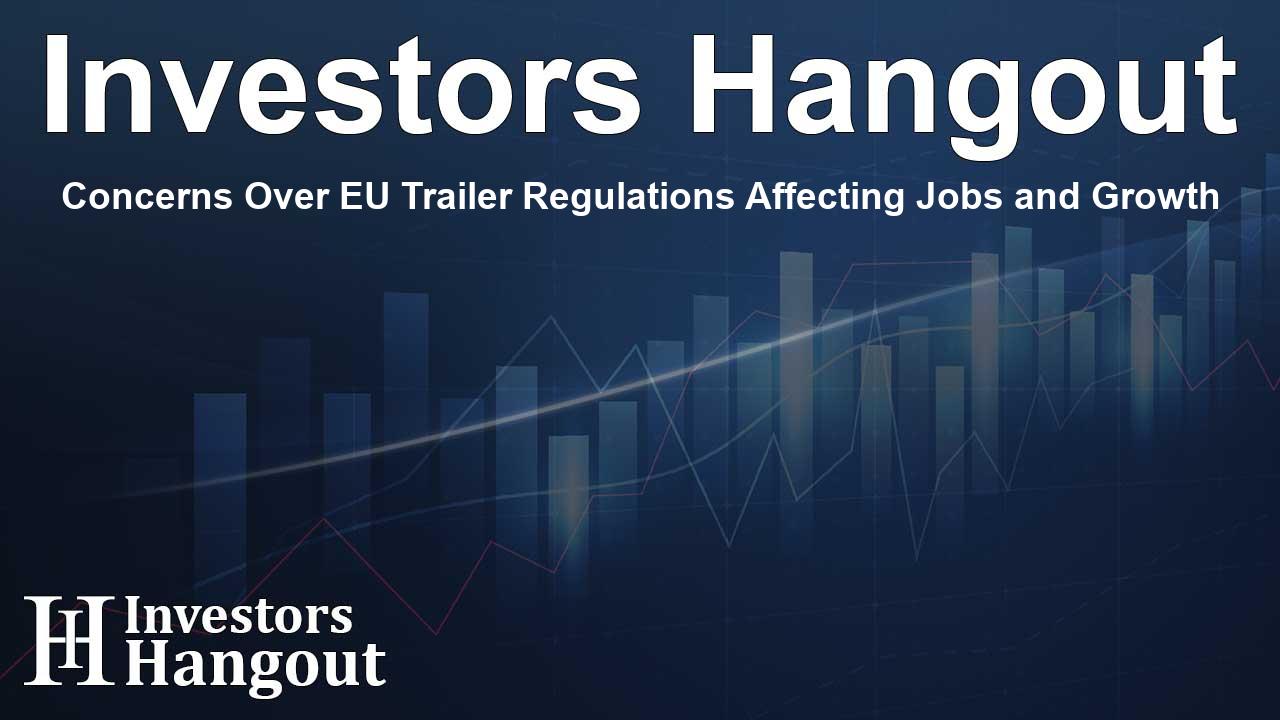Concerns Over EU Trailer Regulations Affecting Jobs and Growth

Regulatory Challenges Facing the Trailer Industry
Efficient climate protection requires realistic solutions. Recently, a coalition of eight prominent truck trailer manufacturers has initiated legal proceedings against European Union regulations that threaten not only industry growth but also over 70,000 jobs.
Legal Action Against EU Regulations
The manufacturers have filed an appeal with the European Court of Justice, questioning the validity of certain provisions within Regulation (EU) 2024/1610. This regulation imposes strict CO? reduction targets specific to trailers, despite the fact that trailers themselves are not direct CO? emitters. While these companies understand the necessity of climate goals, they emphasize the potential consequences of regulations that do not align with practical realities.
Implications of CO? Targets
The current regulation mandates a 10% reduction in CO? emissions for semi-trailers and 7.5% for other types of trailers beginning July 1, 2024. The assessment tool employed, VECTO-Trailer, bases these targets on simulations rather than real-world data. Should manufacturers fail to comply with the targets, penalties could reach €4,250 per vehicle for each gram of CO? emitted per tonne-kilometre, potentially increasing the cost of trailers by up to 40%.
Concerns About Methodology
Gero Schulze Isfort, spokesperson for the group of manufacturers, remarked, "Simulating CO? savings while increasing the number of trucks on the road contradicts climate objectives. This approach could jeopardize actual efficiency gains and increase production costs drastically.” He further stated that regulatory frameworks must acknowledge practical efficiencies rather than rely on theoretical metrics to ensure true sustainability.
Transport Efficiency at Risk
The industry points out that modern trailers significantly enhance transport efficiency through innovative designs, including lightweight materials and advanced aerodynamics. The focus of the regulation on isolated factors fails to recognize the broader implications these developments have on logistics and actual emission reductions. Schulze Isfort argues, "Holistic thinking is crucial; genuine CO? savings can only be achieved through streamlined transport operations across the board."
Proposed Adjustments to Regulations
The manufacturers are advocating for several modifications to avoid potential economic damage:
- The elimination of the VECTO-Trailer simulation tool.
- Implementation of a moratorium on penalties until achievable targets are established.
- Recognition of zero-emission trucks in trailer CO? calculations.
The Economic Context
The eight plaintiff companies, which encompass Fliegl Fahrzeugbau GmbH, Kögel Trailer GmbH, Krone Commercial Vehicle SE, and others, represent more than 80% of annual registrations in relevant trailer segments across Europe. They are committed to the Paris Climate Agreement, recognizing that compelling climate protection initiatives must be both economically viable and technically feasible.
However, without adjustments to the Regulation, there exists a significant risk to more than 70,000 jobs within the industry. The ramifications of such economic shifts would profoundly impact both the German and European manufacturing sectors.
Industry Support
The German Association of the Automotive Industry (VDA) echoes these concerns, highlighting the unachievable nature of the current CO? targets and the existential threat they pose to the trailer manufacturing sector in Germany and beyond.
Contact Information
For further inquiries, please contact:
GloNet Communications
Dr. Karin Funke-Rapp
Phone: +49 176 62755085
Email: [Email Contact]
Frequently Asked Questions
1. What are the concerns raised about the EU regulation?
The concerns revolve around the unrealistic CO? reduction targets for trailers, which the manufacturers argue could lead to economic damage and increased emissions.
2. What regulatory provisions are being challenged?
The manufacturers are challenging the simulation tool VECTO-Trailer and the binding emission targets that they deem economically unfeasible.
3. How could these regulations affect jobs?
The current regulations threaten to jeopardize over 70,000 jobs within the trailer manufacturing industry due to potential increased costs and penalties.
4. What alternative actions are being proposed?
They propose abolishing the simulation tool, instituting a moratorium on penalties, and accounting for zero-emission vehicles in CO? targets.
5. How is the industry supporting climate goals?
While advocating against these regulations, the manufacturers maintain their commitment to efficient climate goals that support both the environment and economic viability.
About The Author
Contact Logan Wright privately here. Or send an email with ATTN: Logan Wright as the subject to contact@investorshangout.com.
About Investors Hangout
Investors Hangout is a leading online stock forum for financial discussion and learning, offering a wide range of free tools and resources. It draws in traders of all levels, who exchange market knowledge, investigate trading tactics, and keep an eye on industry developments in real time. Featuring financial articles, stock message boards, quotes, charts, company profiles, and live news updates. Through cooperative learning and a wealth of informational resources, it helps users from novices creating their first portfolios to experts honing their techniques. Join Investors Hangout today: https://investorshangout.com/
The content of this article is based on factual, publicly available information and does not represent legal, financial, or investment advice. Investors Hangout does not offer financial advice, and the author is not a licensed financial advisor. Consult a qualified advisor before making any financial or investment decisions based on this article. This article should not be considered advice to purchase, sell, or hold any securities or other investments. If any of the material provided here is inaccurate, please contact us for corrections.
